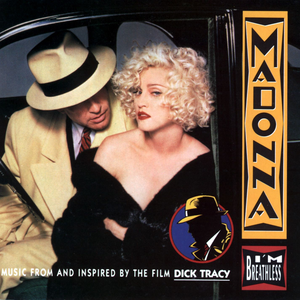
I'm Breathless is an album by American singer and songwriter Madonna, released on May 22, 1990, by Sire Records to accompany the film Dick Tracy. The album contains three songs written by Stephen Sondheim, which were used in the film, in addition to several songs co-written by Madonna that were inspired by but not included in the film. Madonna starred as Breathless Mahoney alongside her then-boyfriend Warren Beatty who played the title role, Dick Tracy. After filming was complete, Madonna began work on the album, with Sondheim, producer Patrick Leonard and engineer Bill Bottrell. She also worked with producer Shep Pettibone on the album's first single, "Vogue". The album was recorded in three weeks, at Johnny Yuma Recording and Ocean Way Studios, in Los Angeles, California.
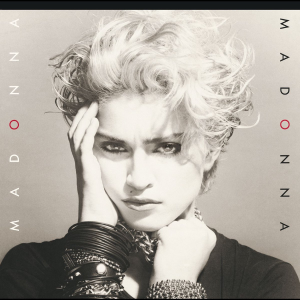
Madonna is the eponymous debut studio album by American singer Madonna, released on July 27, 1983, by Sire Records. In the late 1970s, Madonna had established herself as a singer in downtown New York City; alongside her Michigan boyfriend Stephen Bray, she put together a demo tape with four dance tracks and began pitching it around local nightclubs. She managed to get Mark Kamins, the resident DJ at Danceteria, to play "Everybody" —one of the songs from the tape. The song was met with a positive reception from the crowd, and Kamins took Madonna to Sire Records, where label president Seymour Stein signed her on for three twelve-inch singles. Following its release on October 2, 1982, "Everybody" found success on the dance scene, and the label approved the recording of an album.
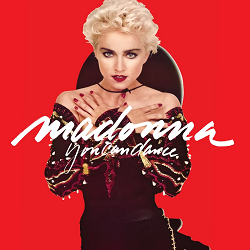
You Can Dance is the first remix album by American singer and songwriter Madonna. It was released on November 17, 1987, by Sire Records. The album contains remixes of tracks from her first three studio albums—Madonna (1983), Like a Virgin (1984) and True Blue (1986)—and a new track, "Spotlight". In the 1980s, remixing was still a new concept. The mixes on You Can Dance exhibited a number of typical mixing techniques. Instrumental passages were lengthened to increase the time for dancing and vocal phrases were repeated and subjected to multiple echoes. The album cover denoted Madonna's continuous fascination with Hispanic culture.

"Music" is a song recorded by American singer Madonna as the title track for her eighth studio album of the same name (2000). It was released as the lead single from the album to radio on August 1, 2000, by Maverick and Warner Bros. Records and commercially released on August 21. "Music" was inspired by a Sting concert Madonna attended and was written and produced by her with Mirwais Ahmadzaï. It is a electropop, disco, electro-funk and dance-pop song in a static key of G minor. Madonna's vocals are electronically manipulated in the track, with the lyrics having political and social undertones and reiterating the uniting power of music.
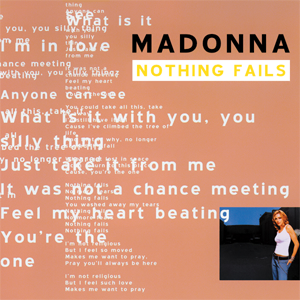
"Nothing Fails" is a song by American singer-songwriter Madonna from her ninth studio album, American Life (2003). Written by Madonna, Guy Sigsworth and Jem Griffiths, and produced by the singer along with Mirwais Ahmadzaï and Mark "Spike" Stent, it was released as the third single from the album on October 27, 2003. Originally demoed as "Silly Thing", "Nothing Fails" is a love song which has acoustic guitar chords and a gospel choir appearance. Lyrically, the song discusses a lover who is the one, and how their meeting was not just chance. A number of remixes of the song were done, with one of them being included on Madonna's remix album Remixed & Revisited (2003).
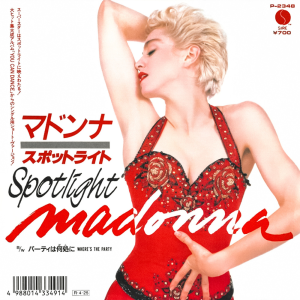
"Spotlight" is a song by American singer Madonna from her first remix album You Can Dance (1987). It was released as a single in Japan on April 25, 1988 by Sire Records and Warner-Pioneer Japan. Initially rejected during her True Blue album recording sessions, the song was written by Madonna, Stephen Bray and Curtis Hudson who had presented the original to the singer. The song was remixed by John "Jellybean" Benitez.

"Lucky Star" is a song by American singer Madonna from her self-titled debut studio album (1983). Produced by Reggie Lucas, it was written by Madonna with the intention that her friend Mark Kamins would play it in his sets at Danceteria, where he was the resident DJ. In 1982, Madonna was signed on by Sire Records for the release of two 12" singles; after the success of first single "Everybody", the label approved the recording of an album, and the singer decided to work with Lucas. However, problems between Madonna and the producer arose and he ended up leaving the project; she then called John "Jellybean" Benitez, her boyfriend at the time, to work on the remaining songs.
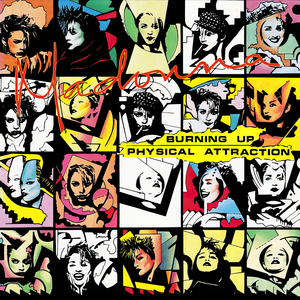
"Burning Up" is a song written and recorded by American singer Madonna included on her debut studio album Madonna (1983). Written by the singer and produced by Reggie Lucas, the song was released as a double-sided single with "Physical Attraction" on March 9, 1983. In early 1980, Madonna was beginning her music career as a member of band the Breakfast Club; together with band drummer Stephen Bray, they formed a new band, Emmy and the Emmys, but shortly after, she decided to pursue a solo career. She and Bray created demos for three songs: "Everybody", "Ain't No Big Deal", and "Burning Up".
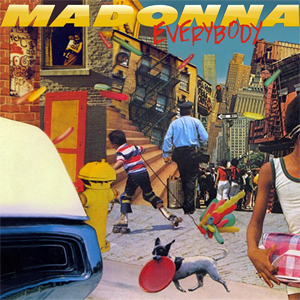
"Everybody" is a song written and recorded by American singer Madonna and produced by DJ Mark Kamins. In 1982, the singer was living with her former Michigan boyfriend Stephen Bray in New York, and since dance music was in style, they created a demo with four dance tracks, one of which was "Everybody". Madonna, who was not signed to any record label at the time, pitched the tape on her own: she would go to local nightclubs and try to convince the DJs there to play it. She met and befriended DJ Mark Kamins at Danceteria nightclub, who played "Everybody" to a positive reception from the crowd. Afterwards, Kamins took the tape to Sire Records, where Seymour Stein, the label's president, signed Madonna for two twelve-inch singles.
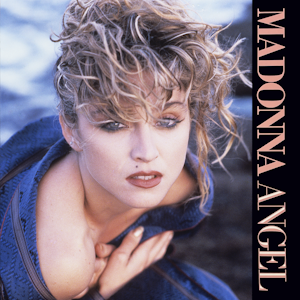
"Angel" is a song by American singer Madonna from her second studio album Like a Virgin (1984). It was released on April 10, 1985, by Sire Records as the album's third single. Written by Madonna and Steve Bray, it was one of the first songs developed for the project and, according to Madonna, was inspired by a girl who is saved by an angel, and she falls in love with him. "Angel" was released as a 12-inch single with "Into the Groove" in some countries and charted likewise. A music video was not filmed for "Angel", and instead, a promotional clip comprising segments of her previous videos was released in the United Kingdom.

"Another Suitcase in Another Hall" is a song recorded by Scottish singer Barbara Dickson, for the 1976 concept album Evita, the basis of the musical of the same name. The musical was based on the life of Argentinian leader Eva Perón. Written by Tim Rice and Andrew Lloyd Webber, the song is presented during a sequence where Eva throws her husband's mistress out on the streets. The latter sings the track, wondering about her future and concluding that she would be fine. The songwriters enlisted Dickson to record the track after hearing her previous work.
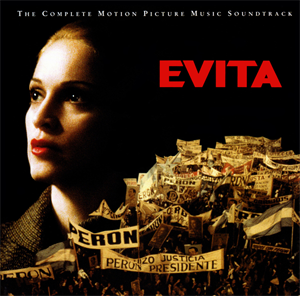
Evita is the soundtrack album to the 1996 musical film of the same name, performed mostly by American singer Madonna. It was released by Warner Bros. Records on October 28, 1996 in the United Kingdom and on November 12, 1996, in the United States. Directed by Alan Parker, the film was based on Tim Rice and Andrew Lloyd Webber's 1978 musical Evita about First Lady of Argentina Eva Perón, portrayed by Madonna. The soundtrack consists of reworked songs from its original 1976 concept album as well as a new song, "You Must Love Me". Additional performers on the soundtrack include Antonio Banderas, Jonathan Pryce and Jimmy Nail.

Something to Remember is a compilation album by American singer Madonna, released by Maverick Records on November 3, 1995. The album was conceived after a highly controversial period in Madonna's career, during which many critics speculated that her career was in decline. The compilation of ballads presented a softer image for the singer and span over a decade, including a reworked version of "Love Don't Live Here Anymore" as well as three new songs: "You'll See", "One More Chance" and a cover of Marvin Gaye's "I Want You". The singles "I'll Remember" and "This Used to Be My Playground", were also included, marking the first time these songs were featured on a Madonna album.
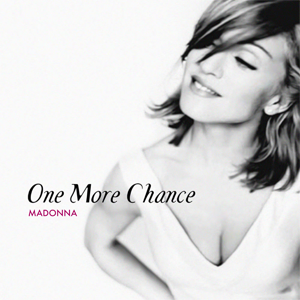
"One More Chance" is a song by American singer Madonna for her ballads compilation album, Something to Remember (1995). Written and produced by Madonna and David Foster, it was released on March 7, 1996 by Maverick Records as the album's second single in Australia and Japan, and the third single in the European countries. An acoustic pop ballad, the song lyrically talks about attempting to win a lost lover back. The song was inspired by Madonna's real life experience, but she wrote it from the opposite point of view.

"Rescue Me" is a song by American singer Madonna from her first greatest hits album, The Immaculate Collection (1990). Written and produced by Madonna and Shep Pettibone, the song was released as the second single from The Immaculate Collection on February 26, 1991, in the United States, and as the third single on April 7 in the United Kingdom. A dance-pop and gospel-house track, the song is accompanied by the sound of thunder and rain, with the lyrics talking of romantic love rescuing the singer.

"Keep It Together" is a song by American singer Madonna from her fourth studio album, Like a Prayer (1989). It was released as the fifth and final single from the album in the United States, Canada and Japan on January 30, 1990, by Sire Records. Written and produced by Madonna and Stephen Bray, the main inspiration behind "Keep It Together" was Madonna's relationship with her family—whom she dearly missed during her divorce from Sean Penn. The song was dedicated to the American band Sly and the Family Stone. The lyrics deal with the realization of how important Madonna's family has been to her life. A pop, funk and deep funk song consisting of an upbeat rhythm and groove, "Keep It Together" features instrumentation from percussion, banjo and a conga.

"Sidewalk Talk" is a song by American record producer John "Jellybean" Benitez from his first extended play, Wotupski!?! (1984). It was released on October 21, 1984, by EMI Records as the first single from the EP. The song was written by Madonna and produced by Benitez. They had initially met in 1983 and Benitez worked as a producer on Madonna's self-titled debut album. When he started work on his debut EP, Wotupski!?!, Madonna wrote "Sidewalk Talk" for him. The song features bass and electric guitars, synthesizers, piano, and drums. Lead vocals are by Catherine Buchanan with additional chorus vocals by Madonna.

Breakfast Club is an American musical group. Their biggest hit single was "Right on Track" (1987), which peaked at No. 7 on the US Billboard Hot 100 chart. The song was remixed for a commercial release in a 12" version for dance and club play by John "Jellybean" Benitez and became a top 10 hit on the Billboard Magazine Hot Dance Club Play chart. After 35 years of absence, in 2022 the band reformed and released a new single called "Could We Not Stop Dancing?" followed by "Fantasy Street" in December 2023.
"Impressive Instant" is a song by American singer-songwriter Madonna from her 2000 studio album Music. Originally intended to be the fourth single of the album, the release was cancelled due to a disagreement between Madonna and her recording company. Finally Warner Bros. released it in the United States as a promotional single on September 18, 2001. Written and produced by Madonna and Mirwais Ahmadzaï, the track is bright and uplifting in its content and composition. It was the first song that Madonna and Ahmadzaï worked on and recorded. Ahmadzaï had to work separately on his laptop to generate the sound elements which Madonna wanted in the song, since it was difficult to generate the music in the recording studio. "Impressive Instant" has been described as a club-savvy acid techno, pop-trance, electropop and electro house stomper containing futuristic keyboard lines, with Madonna's vocals being distorted and robotic. Backed by laser noises and synths, the song's lyrics deal with love at first sight, and contains somewhat absurd, nonsensical lyrics.

"Physical Attraction" is a song by American singer Madonna. It was included on her debut studio album Madonna (1983). Written and produced by Reggie Lucas, the song was released as a double A-side single with "Burning Up" on March 9, 1983.

















